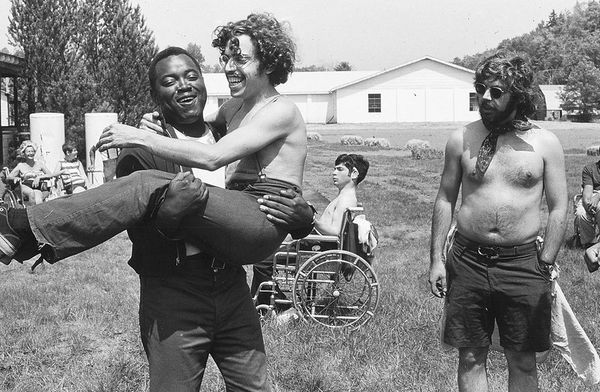Eye For Film >> Movies >> Crip Camp (2020) Film Review
Crip Camp
Reviewed by: Amber Wilkinson

This documentary from Nicole Newnham and Jim LeBrecht strikes a good balance between informing, educating and entertaining as it tells the story of how a group of people who met at an unlikely summer camp would go on to spearhead activism that changed the landscape of America for those with disabilities. It's also as irreverent as that title suggests.
The directors show plenty of nous in the order they attack those Reithian principles, by aiming squarely for the entertainment jugular at first. The film begins with LeBrecht recalling his own childhood living with spina bifida. Footage shows he was an adventurous and active kid, who was encouraged to be outgoing by his family. In the early 70s, when he was 15, he attended the Crip Camp of the film's title, more formally known as Camp Jened - a shoestring set-up "for the handicapped" run in the Catskills by hippies. Using fabulous footage shot by People’s Video Theater, LeBrecht and other attendees begin to tell the stories of going to the camp and its life-changing effect.

It may seem to have been held together with by goodwill and heavily reliant on volunteers with more enthusiasm than experience but the camp was a success because it brought together youngsters with a wide range of disabilities - from polio to cerebral palsy and blindness - many of whom had been living isolated lives, marginalised from the school system. During the course of the summer, the kids shared their experiences, bonded - to the extent that many caught crabs - and generally had a whale of a time.
The archival footage is full of joy and also shows the patience and empathy the kids had with one another - something that was often in short supply in their everyday world dominated by the able-bodied. LeBrecht and Newnham let this footage play out with observations from some of the adults who were there, before the film opens out into a more political sphere to tell what happened next. In 1973, an act was passed in the States that aimed to protect the disabled from discrimination but as the film shows, the warm words were accompanied by little action. It was, in fact, not until the 1990 Americans With Disabilities Act that the world of accessibility we know now began to open up.
Crip Camp, charts the way in which those kids from Camp Jened led the protests that eventually brought the act into being. At the forefront is Judy Heuman - left disabled as a child by polio - a former Camp Jened-atttendee-turned-activst who co-founded the movement Disabled In Action in 1970 and who became the driving forcefor better access and rights. These protests through the Seventies - which included a sit-in that was incredibly physically challenging for many of the participants, a hunger strike and a demonstration that saw protesters get out of their wheelchairs and drag themselves up the steps at the Capitol - are a reminder of how quickly we forget these non-mainstream stories.
Although the film has an American focus, it holds universal appeal in its celebration of the achievements of this group of remarkable people, who refused to abide by society's expectation that they stay quiet and invisible. It also makes you wonder what similar stories could be told about the UK (where the Disability Rights Act didn't come into effect until 1995). Let's hope that as the push for more diversity in cinema continues, more of these unsung histories are brought into the spotlight.
Released in the 30th anniversary year of the American Disabilities Act and produced by the Barack and Michelle Obama's production company Higher Ground, the film - which premiered on the opening night of Sundance - will hit Netflix on March 25.
Reviewed on: 31 Jan 2020














